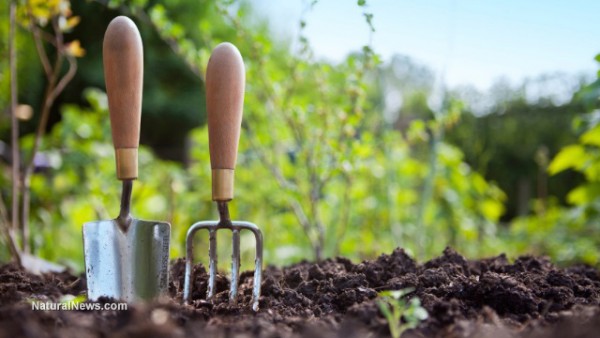How gardening has actually become an act of defiance against our oppressive political system
07/08/2016 / By D. Samuelson

“Food is a weapon.” Earl Butz, Richard Nixon’s Secretary of Agriculture, made that statement. The year was 1971, riding the waves of the first “green revolution” exported from the U.S. replete with hybrid seeds, fertilizers, pesticides and farming equipment like tractors and combines. Mr. Butz had determined that food was an important weapon in the fight communism. His words did not reflect a new idea. Famines throughout history, both real and man made, have subjugated people and changed national boundaries. A mere fifty years ago, during Mao Zedong’s Great Leap Forward, millions of Chinese citizens were taken from cities and forced onto farms. Whatever was produced was given to the regime. An estimated forty – fifty million Chinese starved. For reference, check out Jasper Becker’s book, Hungry Ghosts. Mao’s role model was Stalin, whose modernization plan in Russia twenty years earlier willfully starved seven million independent Ukrainians. Many were farmers. Every seed we plant and every bite we take makes a difference.
Way before GMOs and corporate industrial agriculture, we were a nation built on farming and agriculture
In 1790, 90% of Americans were farmers. By 2002, that percentage had dropped to 1.9. In between, there was a golden age for those who made their income from the land as well as fledging back yard gardeners. Seed banks, county agricultural offices and land grants were created to assist all who wanted to grow food, flowers or animals and increase the productivity of each. Those days are now long gone. In fact, at the same time when organic agriculture, farmer’s markets and small family farms are flourishing in efforts to provide the nutritious, wholesome food families want, the government is cracking down on the inalienable right to feed one’s family. The tiny town of Sugarcreek, Missouri, according to Natural News, has now banned all “food vegetation . . . within thirty feet of a city street.” Before the ordinance was passed, homeowner Nathan Athans also paid fines in order to keep his burgeoning vegetable garden. Seems his neighbors didn’t care for rich black soil sprouting life.
100% organic essential oil sets now available for your home and personal care, including Rosemary, Oregano, Eucalyptus, Tea Tree, Clary Sage and more, all 100% organic and laboratory tested for safety. A multitude of uses, from stress reduction to topical first aid. See the complete listing here, and help support this news site.
Director Kristen Canty documented the current war on farmers in Farmageddon
The 2011 documentary Farmageddon is a terrifying look at the brutal tactics being used against farmers, raw food cooperatives and animal husbandry operations in America. Imagine being told your healthy flock of imported lambs is infected with a horrific disease – which isn’t proven – and they must be destroyed. Or a SWAT team rifling its way into the home of family, including young children, who run a small rural coop in Ohio? Or pouring out fifty gallons of rich raw milk cause a county official told you to?
Food is indeed a weapon. And we are in a war.
The Animal and Plant Inspection Service (APHIS) is under the aegis of the United Stated Department of Agriculture (USDA.) As reported on page seventeen in The Militarization of America, Aphis spent $4.77 million on shotguns, liquid explosives, drones, .308 caliber rifles, night vision goggles, military canons and more between 2006 – 2014. The USDA is also investing in infrastructure across rural America under the guise of “helping farmers.” Are they positioning themselves for a food grab? Were those folks in Farmageddon just target practice?
Be a revolutionary. Plant a seed. Watch it grow. Eat clean food.
The fight for small farms continues in parts of Michigan, but at the same time, Detroit, Boston, Austin, New York, Seattle and other cities are investing in urban agriculture. During World War II, the government actually encouraged backyard gardens. It was considered “good citizenship.” Today, Wakingtimes.com describes growing your own as “propaganda gardening, a combination of guerilla gardening and political protest.” Bring your pitchfork and your shovel!
Sources:
(Photo credit: Library.illinois.edu)
Tagged Under: Farmageddon, Food is a Weapon, Guerilla Agriculture, Kirsten Canty, Man made famine, Planting a seed, Revolutionary Acts with Farming, Urban agriculture, USDA war on farmers




















